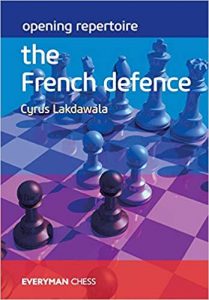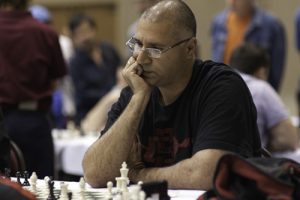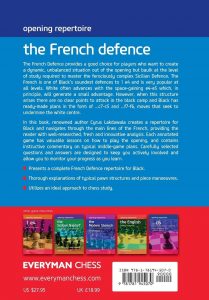
Contents : Bibliography, 8 Chapters, Indexes of Variations and 58 complete games including 3 by the author.
I was due to review this book about two months ago and had even made some notes, intending to return when the heat died-down at work. Never happened. Trouble is the French 1 e4 e6 is a favourite of mine and writing about it is like dancing naked in my own back garden.
Now – don’t say it – there is no exact parallel, for example my garden is quite small and unlikely to accommodate any dance routines, even if I could dance, which I can actually. Badly.
It was Korchnoi who, at an Olympiad long ago, was spotted, not dancing, but hastily hiding a book he’d just bought. It was, I believe, the Winawer by Moles, now a forgotten Batsford. Korchnoi loved the French and, as he got older, seemed to be playing it more and more. What he’d have thought of this book I don’t know but guess he’d have given it his time. Do the same and read on!
Areas covered include: the Anti Winawer, the Main Line Winawer 4 e5, the Tarrasch, the Advance 3 e5, the King’s Indian Attack and 2 Qe2, the Exchange Variation 3 exd5, the Two Knights Variation and finally, Second Move Alternatives such as 2 b3 and 2 f4.
Cyrus Lakdawala is an IM and former US Open Champion who teaches chess and has written over 25 books on chess openings.

IM Cyrus Lakdawala has been knocking around the chess world long enough to have developed, I hope, a thick skin. He writes with emotion, colour, humour, a broad brush but he does attract his critics. If you like your chess games dished-up in neat bundles with Informatorish symbols, names put backwards (“Talj, Mik (2600) Hail) then look elsewhere. Nor is this a book of reference so don’t go searching, necessarily, for an improvement on last night’s game. There are books which are essentially lists of games and these do help, like databases, but here we are far from that part of the forest. The author is an entertainer and so much else. Drops of philosophy creep in, good humour, lore and order.
Behold:
” When you love someone, it feels that you are with them even when they are far away” (p 85). Or ” A seasoned bazaar haggler makes a shrewd counter-offer” (p 134). We continue: ” Don’t follow principles blindly” (p 108). Also ” Open the position when you hold the bishop-pair.” (p 102) and finally “There are many mushrooms and berries in the forest that can kill us.” (p 121).
Well, that gives you a flavour. The Bibliography he lists is a bit dated, newer editions of some books are, I’m sure, available to him. As for the reader – easy to forget him (?) – questions throughout the text, nothing too complex, are highlighted. Oh, in the Tarrasch 3 Nd2 he calls 4 … Qxd5 the most theoretically complicated line in the whole book. I can’t agree that the Petrosyan/Bronstein line in the Winawer with x … b6 and … Qd7 is better than a more conventional 4 … c5, as Uhlmann might have favoured, but readers will enjoy correcting me.
Finally, his 8 … Ne8! in the King’s Indian section is a joy.
For a cover price of £18.99 I think this good value. The author is an American IM and I promise not to mention my dancing ever again.

James Pratt, Basingstoke, June, 2019
Book Details :
- Paperback : 366 pages
- Publisher: Everyman Chess (15 Feb 2019)
- Language: English
- ISBN-10: 1781945071
- ISBN-13: 978-1781945070
- Product Dimensions: 16.9 x 2 x 24.1 cm
Official web site of Everyman Chess

